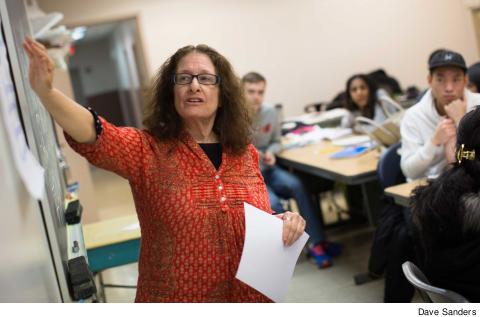For CUNY Language Immersion Program (CLIP) and CUNY Start instructors, work has always been more than a part-time job. Now, thanks to the latest PSC contract settlement, they are no longer paid on an hourly, part-time basis. They are full-time instructors.
 |
Nora Fussner, a CUNY Start teacher who is in the classroom five days a week, said that being compensated as part-time workers was an “insult” to the work instructors do.
“I’m in the classroom 25 hours a week and that doesn’t include grading and lesson-planning,” said Fussner, who teaches at Kingsborough Community College. “Being full-time is acknowledging that this is not a part-time job.”
ONE-YEAR APPOINTMENTS
This February, because of the new PSC-CUNY contract, more than 150 teachers in CLIP and CUNY Start were converted from the hourly continuing education teacher title to full-time CUNY Start Instructor and CLIP Instructor. Instructors now receive one-year appointments, have a salary schedule with annual step increases, are paid biweekly over the entire year and are assured that their health insurance and Welfare Fund benefits will continue even when the programs are not in session.
Getting paid over the summer for Fussner is a “huge” win. “I don’t have to sock away a portion of each paycheck to save for those weeks that I won’t get paid,” she said.
Both programs provide vital skills development for CUNY students before they enroll in academic courses. CLIP, an intensive English as a second language program, focuses on improving students’ reading, writing, communication and analytical skills. CUNY Start is offered to students who have not passed one or more sections of CUNY assessment tests, so classes focus on improving reading, writing and math skills. Classes generally meet five days a week and teachers have been pushing for full-time status for years. Finally, they have prevailed.
Anthony Prato, a CLIP instructor at Queensborough Community College, is happy that their persistence paid off.
“It means a lot because many of us worked really hard to accomplish this,” said Prato, who was a part of the CLIP-Start Alliance, a PSC committee that worked to draw attention to teachers’ issues.
Both programs have quietly prepared students to succeed academically, and, with the current chancellor’s emphasis on improving graduation rates and shortening the time to graduation, their work has become more important than ever. The CLIP program has existed since the mid-1990s, and PSC has sought to win improvements in their salaries and benefits since 2002, as the program expanded. The Start program has existed since 2009 and has been expanding rapidly since then.
Ellen Balleisen, a former CLIP teacher and now director of CLIP and CUNY Start at Bronx Community College, says the achievement of full-time status for these instructors is “massive.” “This is a very substantial improvement,” said Balleisen, who was active in securing improvements for teachers for more than a decade. “It’s worth more than all the previous improvements combined.” Balleisen, who taught for CLIP from 1997 to 2011, has seen many of her former students go on and work for CUNY, including an admissions officer at City College and an adjunct at Bronx Community College.
MORE TIME WITH STUDENTS
For Caryn Davis, who has been teaching with CLIP for 10 years, the yearlong, full-time appointment means she will not always be required to teach during the summer program, but will not suffer a suspension in her benefits – and that is a welcome opportunity. Teachers can use the time for professional development, she said. With some security in place, Davis looks forward to putting time into her classroom for her and her students. A typical class for her at New York City College of Technology includes around 25 students.
“Every single class is always multilevel. I’ve become skilled at teaching this way,” Davis said. “The environment is language-rich – all the time.”
A constant benefit of the job, Davis said, is teaching motivated students. Davis recalled the effort of one of her students: an Iraqi immigrant, who worked 50 hours a week at a deli and also attended CLIP classes. Davis said the student would write his essays during work breaks and he would always submit them on time, oftentimes taking on extra assignments. Once he enrolled in college, he was soon taking honors classes and working as a math tutor. Taking a class with a CLIP instructor is an intensive experience.
Carol Guasti, a CLIP instructor at New York City College of Technology, works rigorously on improving her students’ critical thinking and communication skills. Students in her class write 10 compositions that go through several drafts.
“The difference between the first essay and the last essay can sometimes be astonishing,” Guasti said.
Students come to understand the links between ideas, recognize how to build arguments, and when analyzing story, they can see how parts of a story link together and how character is developed. A major goal for Guasti is to transform her students from “passive recipients” of knowledge to “active learners.”
In addition to teaching reading and writing skills, CLIP and CUNY Start instructors hone skills that will help students survive in rigorous academic environments.
TEACHING BASIC SKILLS
“Every semester I am astounded by how basic study skills – keeping papers organized, completing assignments, asking questions if confused, remaining awake and alert in class, taking notes, the list could go on and on – are foreign to so many students,” said Heidi Fischer, a CLIP instructor at City Tech, in an email. “If [students] leave our program knowing how to learn, knowing how to compensate for their individual challenges, knowing how to persist through ambiguity, I know that they will eventually succeed.” For Fischer, one of the hardest parts of her job before the contract gain was the lack of guaranteed work over the course of an academic year, and she’s happy to put that worry in the past.
“My class is currently studying the plight of migrant farm workers, and while obviously not as dire as their situation, the fundamental issue of job security is sadly similar,” Fischer said. “Or, I should say, ‘was.’”

